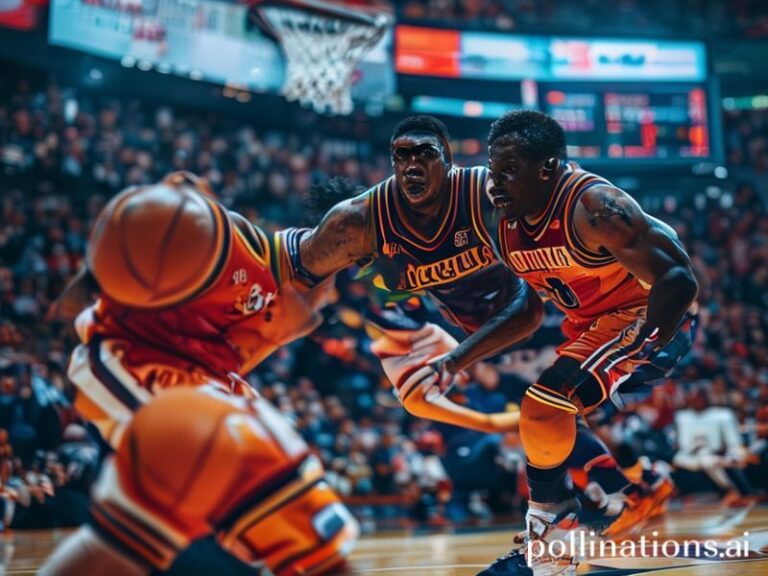Jason Kelce: The Bearded Prophet Who Explains America to the Rest of the Planet
Jason Kelce and the Global Theater of Linemen: How One Bearded American Gladiator Explains Everything
There comes a moment—usually around 3 a.m. in a Berlin hostel kitchen—when a French backpacker, two Korean crypto-traders, and a Canadian on a gap year discover they share a single cultural reference point: the bearded, bare-chested, beer-sloshing demigod known as Jason Kelce. The clip is always the same—Super Bowl LII parade, Mummer’s costume, voice like a gravel road, screaming “No one likes us, we don’t care.” Suddenly, geopolitics evaporates. NATO could dissolve in the background and no one would notice, because the entire room is united in awe of a 300-pound American who looks like he just sacked the Visigoths.
From an international vantage, Kelce is less a football player than a living metaphor for the United States’ ongoing identity crisis: loud, sentimental, strangely self-aware, and dressed like a parade float designed by a fever dream. The rest of the planet watches the NFL the way medieval peasants watched bear-baiting—equal parts horror and envy—yet Kelce transcends the sport. He is the rare export who doesn’t require translation. His beard alone has more diplomatic reach than most UN envoys.
Consider the numbers. NFL Game Pass International claims subscribers in 195 countries; Kelce’s mic’d-up segments are clipped, subtitled, and memed from Lagos to Laos. In São Paulo gyms, “Kelce” is now shorthand for a workout so punishing it induces religious visions. A Tokyo ramen shop offers the “Jason Bowl”: pork broth strong enough to dissolve a motorcycle, served with a side of existential dread. Meanwhile, in Kyiv, territorial defenders wear homemade Kelce jerseys under their body armor, proving that irony, like shrapnel, has no borders.
The world understands Kelce because the world understands the archetype: the jester-prophet who tells the emperor he’s naked, then does a keg stand. When he retired this spring, his press conference—equal parts Shakespearean soliloquy and dive-bar eulogy—was live-translated into 27 languages. French broadcasters called it “unhappiness poetry”; the Finns simply texted each other skull emojis. Even the Chinese internet, not known for its tolerance of unscripted emotion, allowed the hashtag #胖诗人 (“Fat Poet”) to trend for six full hours before censors noticed the subtext about freedom.
But let’s not kid ourselves: Kelce’s global resonance is also a coping mechanism. While the planet inches closer to climate collapse, supply-chain gridlock, and whatever fresh hell Elon Musk tweets next, here’s a man who turned blocking 320-pound sociopaths into a form of performance art. The rest of us doom-scroll; Kelce bodyslams reality for a living. Watching him is cheaper than therapy and only slightly more dangerous.
And then there’s the brother—Travis, the tight end who dates pop stars and sells protein powder to suburban dads who think “tight end” is a compliment. Together they form a two-man soft-power campaign more effective than Voice of America ever managed. If the State Department had any sense, it would replace the F-35 program with a fleet of Kelce brothers, each armed with nothing but podcast microphones and a willingness to cry on cue. World peace by Christmas.
Instead, Jason will spend retirement hosting a podcast in his basement, a fate somehow more terrifying than any blitz he ever faced. The world will listen, rapt, as he dissects zone coverage with the same gravitas other cultures reserve for haiku. Meanwhile, somewhere in Lagos, a kid who’s never seen snow will practice his first offensive line drill, whispering “No one likes us” like a prayer.
Conclusion: Jason Kelce retires not as a mere athlete but as the last universally comprehensible American. In an age when every empire communicates via drone strike or algorithm, he spoke the old language—blood, sweat, and surprisingly literate profanity. The stadium lights dim, the mic drops, and the planet goes quiet for a beat, wondering what on earth we’ll laugh at now that the Fat Poet has left the stage.







